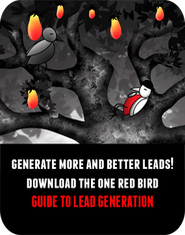Lead scoring is a systematic process for measuring how promising a lead is. Its purpose is to determine how a lead should be marketed to and when the lead needs to be sent to sales.
It’s up to you to develop the specific criteria for the scoring, but there should always be two components: who the lead is and how the lead reacts to marketing.
In measuring who the lead is, you’ll look at criteria such as company, title, industry, buying power, influencer role, etc. The goal is to identify leads that fit your marketing targets.
In measuring what the lead does, you’ll consider things like how often they visit your site, how much interaction they’ve had with the site, and whether they’ve signed up for email communication.
Why Is This Important?
Ask any salesperson and they’ll tell you how crucial it is for leads to be sales-qualified when they come to their desk.
Leads that aren’t ready for sales don’t want to talk to sales. Sales efforts are almost always a waste of time, and they can actually be counterproductive.
Do your sales people keep wondering why your marketing people can’t understand what makes a lead good? And do your marketing people keep wondering why sales can’t close more of the “good” leads they’re providing?
If you’ve got a situation like that in your company, you need lead scoring. With lead scoring, the question of when to pass on a lead to sales isn’t left to “gut”—it’s automatically done, always in line with your marketing strategy.
What Can You Do?
First, you need to develop the criteria for scoring. This involves a healthy dialogue between sales and marketing, as well as data-driven analysis of past lead management successes and failures. Then you can use marketing automation software to manage the scoring. The right software will immediately send leads to sales—or move them further along the lead nurturing process—so that they’re always receiving the attention their score indicates they need.
Don’t get me wrong. Having an automated lead scoring system in place doesn’t mean that you don’t pay attention to common sense. Your system must have flexibility. You need to be able to immediately bump up really hot leads so that opportunities aren’t missed. And because you set the parameters, flexibility is built into lead scoring. You can always easily change your criteria based on what is or isn’t working.
The key is to put a lead scoring system in place, so that your early-stage marketing is done with minimal labor cost—with the appropriate content automatically being delivered based on the lead’s score.
The Bottom Line
Differentiating between leads, so that they’re always receiving the necessary attention, doesn’t need to be a strain. Entirely based on how you have customized your criteria, a lead scoring system does the differentiating for you—allowing sales to focus on closing deals and marketing to focus on strategy and content.



